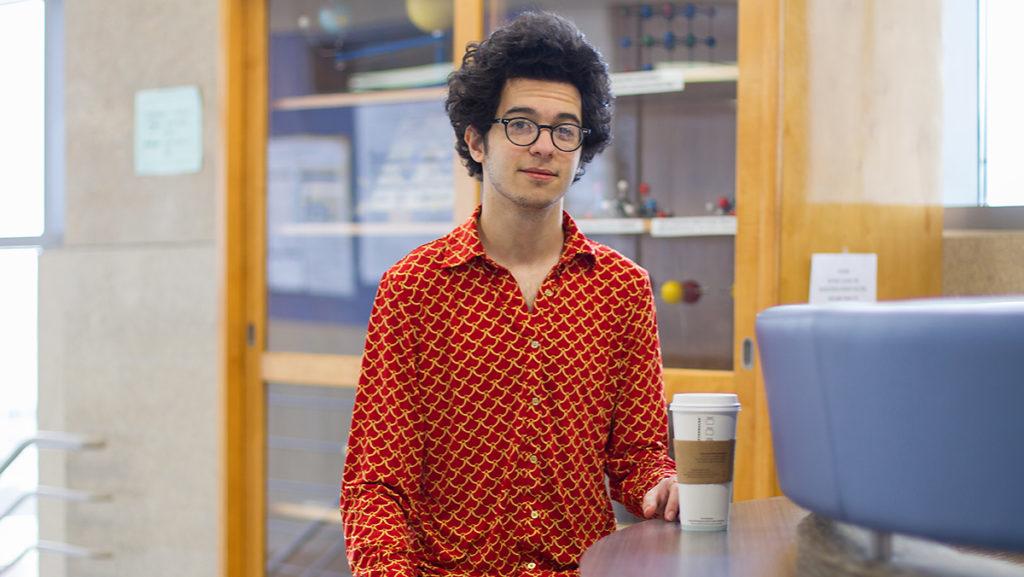Out of a conversation diving into deep, involved topics, a chance gathering of relative strangers came up with an idea for something bigger.
“We were all sitting in the Campus Center Dining Hall, and we didn’t really know each other, and we just started having this crazy conversation about the stuff we were interested in, and we all started talking about … higher-power things,” sophomore Laura Miller said.
As a joke, Miller said, someone mentioned they should make a club, and junior Ravi Gil decided to actually do it. He called it Existentialist Coffee House.
“The reason we created it in this incarnation is we wanted to give people an outlet to express what they’re thinking about and collaborate with other deep thinkers … and to create dialogue between all sorts of different people,” Gil said.
One of Gil’s main motivations was to create compassion between people with opposing viewpoints on divisive topics such as politics or religion. Most people don’t get the opportunity to discuss deeper thoughts in their day-to-day lives, Gil said. He said he wanted to give people who crave profound conversation an outlet to express their ideas.
“We have such an overstimulated culture of technology and stressful existence,” Gil said. “We’re trying to create an avenue for the discussion for the mysterious nature of our existence.”
Gil’s interest in existential topics developed at Ithaca College from an Intro to Buddhism class with Brian Karafin, assistant professor in the philosophy and religion department.
“Buddhism is interesting because it is a religion, but it’s not like Western religions where there are very specific notions of God and how you should act,” Gil said. “One of the central teachings is you should be your own teacher and use your own life experiences to guide you.”
The group, which currently has about 30 members, plans on discussing different philosophies and trying to include a broad range of topics spanning from religion to human consciousness. Gil said there will be designated time during each meeting for members to bring up questions they might still have about existence or questions about a topic that was not discussed.
He said the current political climate has left people from both parties feeling incredibly divided and that he would like to create a dialogue to foster compassion from both sides.
“I would like to work with these deep thinkers to try to see if we can find creative ways to spread some joy and positivity in the world,” Gil said. “We’re all humans part of this one collective, and we need to come back together. We’re not going to be able to do it by screaming at each other.”
Executive board members are also interested in collaborating with other clubs to bring in ideas for discussion, Miller said, and try to brainstorm solutions that would help make the world a better place.
“We could collaborate with environmental club and have a conversation about how we don’t own the earth and it’s weird we take everything from it,” Miller said.
The book “Ishmael” by Daniel Quinn sparked Miller’s interest in existential topics. The philosophical novel takes a wide-lensed look at humans’ role in the universe in the form of Socratic dialogue between the two main characters.
“We need people who think about the state of the world rather than just the state of themselves in one fleeting, present moment,” she said. “We want to not only have discussions but also apply some of the things we talk about … to make a mental and physical impact on ourselves and the people around us.”
Sophomore Michael Hanlon, executive board member of the club, helped Gil with the logistics of the club out of a desire to speak with more open-minded people.
“It’s important for us to learn what makes sense for us in our own understanding of reality,” Hanlon said. “We are the only people who can comprehend what is right for us in these topics.”
Despite his passion for existentialism, Gil said he holds no authority over others.
“I’m just a seeker — I don’t know about the nature of our existence, and I’m certainly not a master of this stuff,” Gil said.
Hanlon said his own understanding of consciousness is that the notion of self is an illusion and that doing well for others does well for one’s self and everyone else.
“There is no such thing as doing something for other people that doesn’t benefit ourselves, because we are everything,” he said.
Existentialist Coffee House meets at 8:00 p.m. on Sundays in Clarke Lounge.














